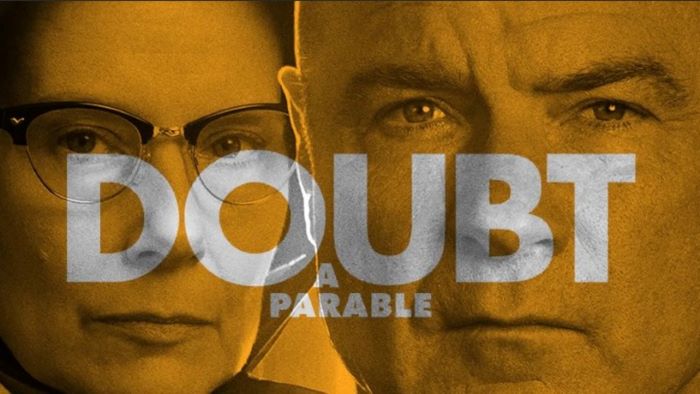It’s been twenty years since John Patrick Shanley’s Doubt: A Parable made its Off-Broadway debut in 2004, followed by a Broadway transfer in 2005, and an Oscar-nominated film adaptation in 2008. The Tony- and Pulitzer Prize-winning play is now back for its first-ever Broadway revival with Roundabout Theatre Company in a limited engagement at the newly renamed Todd Haimes Theatre. Under the steadily probing direction of Scott Ellis, a top-notch cast embodies the distinctive personalities, moral principles, and psychological uncertainties of four characters dealing with a possible case of sexual abuse at a Catholic school. Only the (unseen) student and priest involved know what really happened; the others (the accusing principal, a young teacher, and the boy’s mother), along with the audience, are left to ponder the truth and to confront the inescapable doubts inherent in the unproven but tenable allegation.
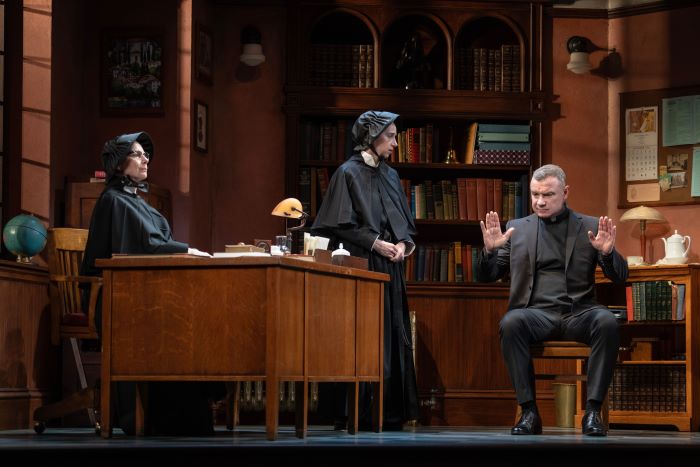
The drama takes place in 1964, during the era of Vatican II – an ecumenical council convened by Pope John XXIII to rejuvenate the Catholic Church – in the fictional St. Nicholas Church, principal’s office, and courtyard garden, in a working-class neighborhood in the Bronx. David Rockwell’s scenic design transitions fluidly from one locale to another, interior to exterior, with the rise of a scrim and the rotation of the Gothicizing architectural set, the entr’acte strains of an ecclesiastical boys’ choir and the cawing of a crow (sound by Mikaal Sulaiman), and evocative shifts in lighting by Kenneth Posner. Our opinions and sympathies flow back and forth just as easily, with the actors’ committed portrayals and arguments that change from suspicious to trustworthy, credible to questionable, damning to exculpatory, but never to absolute certitude. And that’s precisely the point in the story’s ever-timely examination of the ethical conflict between our current crime-prevention slogan “if you see something, say something” and the de facto legal standard of reasonable doubt.
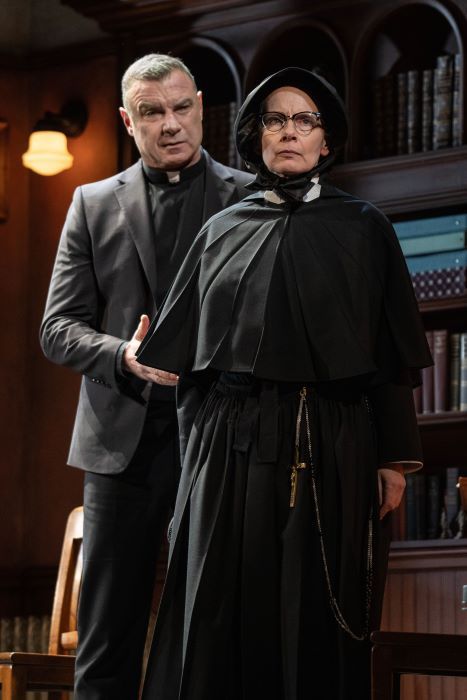
Both the accused and accuser, with New York accents that are well suited to the setting and the demeanors of their characters (voice coaching by Kate Wilson), make their cases with conviction. Liev Schreiber displays a range of personality traits and emotions; he is thoughtful, strong, and self-assured as the progressive, upbeat, loving, and popular teacher and basketball coach Father Flynn, who faces off against the relentlessly strict, old-fashioned, conservative, no-nonsense principal Sister Aloysius, played with intimidating, and sometimes laughable, dictatorial intolerance by Amy Ryan. He delivers charismatic didactic sermons on the topics of doubt and gossip in direct address to the audience (ideas for which he jots down in mid-conversation with the nun), expresses his joy in teaching and concern for his students, and garners the support of the male hierarchy of the Church. She enlists the aid of the naïve Sister James (Zoe Kazan, capturing her character’s youthful innocence, inexperience, and sincere emotions, and, as with Flynn, the rewards she finds in teaching and being appreciated by her students), then confronts him with their suspicions, and, despite his refutation and eventual outrage, relentlessly refuses to back down at any cost – even though a conflicted Sister James is relieved to hear his explanation and tends to believe him. But they all (costumed by Linda Cho in nuns’ habits, priestly liturgical vestments and clerical clothing, with hair and wigs by Charles G. LaPointe), at times, have their doubts, and alternatingly raise ours.
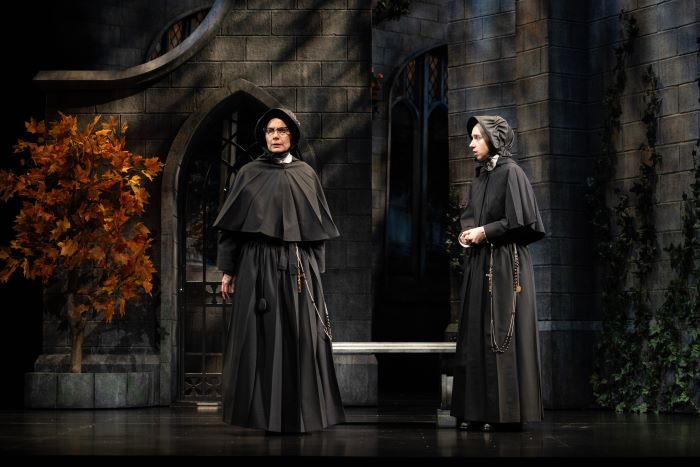
Sister Aloysius also calls Mrs. Muller, the mother of the twelve-year-old Donald (the first and only Black student at St. Nicholas), for a meeting in her office, to discuss her suspicions about Father Flynn’s inappropriate actions with her son and to find out if he revealed anything to her, in the hopes of gaining an ally. Her response, which exposes other concerns that are more pressing to her, comes as an unwelcome surprise; she is appreciative of the kindness and support the priest has shown him, and considers it of tantamount importance that Donald just get through the school year so he can have greater opportunities in high school and college. In an emotionally controlled and psychologically precise performance, Quincy Tyler Bernstine as Mrs. Muller brings all the challenges, ruminations, and heart of the mother to life with depth and sensitivity.
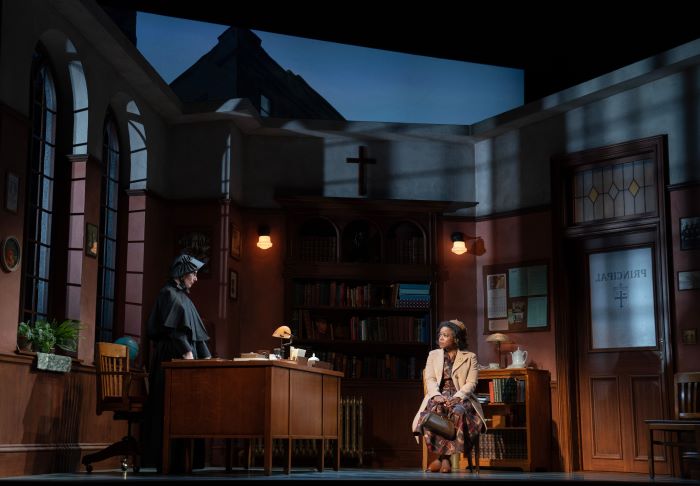
Is the case of Father Flynn yet another example of the molestation of underage parishioners by the clergy and cover-up by the hierarchy of the Catholic Church? Or is it a grievous misinterpretation of a caring priest’s support of his dispirited student? Doubt offers a powerful and resonant examination of the moral dilemma posed by the difficulty in determining guilt or innocence, gossip or fact, fraudulent accusation or self-serving denial, personal antipathy or concern for the community. See it and decide for yourself, or, more likely, come to the realization that you can’t.
Running Time: Approximately 85 minutes, without intermission.
Doubt: A Parable plays through Sunday, April 21, 2024, at Roundabout Theatre Company, performing at the Todd Haimes Theatre, 227 42nd Street, NYC. For tickets (priced at $68-244, including fees), call (212) 719-1300, or go online.
Before you go, you can watch a trailer of the show here:


